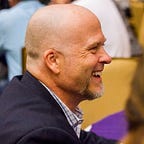Why I am Learning to Forget
A ton has changed in my world, and in a very short period. I just spent a solid week learning about some of these changes. Settling into my seat on my flight home, I finally have time to think about just how different things really are, and come up with a way to adapt to the changes.
The world has shifted to what Forrester dubs “The Age of the Customer”. Companies and business leaders are struggling with it because they are not built for this shift. The methodologies and leadership that were effective in the last age, “The Age of Information”, simply can’t move quickly enough in a customer-centric world.
I’ve spent plenty of time in the product world, and was always frustrated with how poorly we were able to satisfy our customers. It’s hard to have your customer’s best interests in mind when all you seem to offer them is more product eachyear, more upgrades, more add-ons…Sure, a lower price is great! But not if you are selling them something they don’t actually need…or want. When a company is focused on selling to customers, all sorts of selfish behavior creeps into the model, and none of it is focused on customer outcome.
The DNA of that world needs an infusion of new customer-centric DNA.
FORGET
The things that allowed me to be successful in the past will do little to help me succeed in this new age of customer outcomes. A new model is being built, one that should allow me to leverage my expertise without relying on my experience with the previous age of business. The “one size fits all” approach from the “Age of Information” falls on its face when engaging with empowered customers. So, if I can’t expect to service my customers the same way, how can I expect to succeed if I try manage my business the same way?
My experience is only part of the knowledge and skill I received from having done this in the past. I was actually hired for my expertise: my ability to recognize when something won’t work, prompting me to try a new approach.
This is where the hard is. You bet I have confidence when I have a road map in my head to follow, a frame work that produces results that I know how to execute, but when I try to map those established plans to this new paradigm — it breaks. That was a butt-pucker moment for me.
Focus
Personal growth is hard. Continuous learning is a great idea, but the practice isn’t for everyone. It takes time, and a willingness to be humbled. Everyone wants to produce quickly, especially when new to a team. But when you look at some of the time and effort required to be excellent- many people give up.
I believe this is caused by a lack of focus — I’m not talking about the ability to pay attention for long periods of time — I’m talking about not understanding what you are trying to do, and why. For me to move forward, I need to deconstruct my plan, approach it from the customer-outcome perspective, and work backwards to learn where the gaps are.
Sounds easy… it’s not.
Even so, I am excited about the why! Because when you take the “you” out of the plan, and insert “customer” in its place, all sorts of possibilities start to emerge. You stop focusing on why we can’t do things, and start saying things like, why can’t we? A subtle Shift.
Finish
I am putting more emphasis on finishing. Most people are task oriented, and only feel satisfied when they have checked off a certain number of tasks related to a project or activity. This is somewhat arbitrary, and seems only a way to feel personal satisfaction. The truth is, it’s inwardly focused on your result, not on your customer’s outcome. It’s selfish.
For me to develop a model that can be looked back on as a success, I can’t call it finished until we can determine the impact it has on the customer… was the result a win for us, or was it a win for our customers?
Knowing what the outcome should be is key in determining successful execution. When you are immersed in achieving your customer’s outcomes, you begin to understand how flexible you need your plan to be, and how important it is to simplify.
Again… This is where the hard is.
I won’t have all the answers right away. I need a team to leverage, and I need to share the plan and communicate frequently to improve, while injecting the expertise of the entire team.
Just another reason why the plan can’t be complicated.
Shift your view.
m-
★ What do you think? Did this post add value for you?! ★
I really appreciate that you are reading my post. If you enjoyed it, please Like/Comment/Share! If you would like to read my future posts and shares, please Follow! Visit shiftwit.com.
Photo Credit: Focus MICOLO J
Photo Credit: Finishing Tilman Haerdle
Photo Credit: Forget Flood G.
